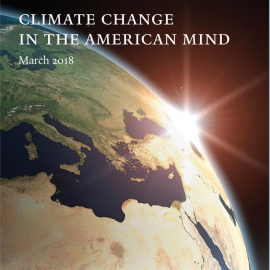Some Very Hopeful Numbers: Changing Attitudes Toward Climate
-
English
-
ListenPause
[intro music] Welcome to World Ocean Radio… I’m Peter Neill, Director of the World Ocean Observatory. We advocate through communications, using every tool available to reach a growing international audience of “Citizens of the Ocean,” to inform, unite, focus, and enable public engagement and response to global challenges to the sustainable ocean. Who do we reach? How many? What are the available means to measure the effect of such an endeavor? We look at website visits, program links, increased numbers of subscribers, and reactions to messaging on social media. On Facebook alone, the World Ocean Observatory has more than 773,000 followers worldwide, a continuous measure of reach, growth, and reaction. These audio editions are a curious case in point: World Ocean Radio is syndicated through 44 stations in the United States, delivered weekly to podcast subscribers, re-posted and shared through internet sites, and heard abroad in Australia, New Zealand, Hong Kong, and along both costs of Africa through internet stream. But even so, does it make any difference? I was heartened this week by a report from the Yale Program on Climate Change Communications, the result of an annual survey taken in the United States measuring the state of public awareness and political views on issues relating to climate reality, global warming, political bias, and the implication of measured opinion for the future. Surveying results from 2008 though 2018, the Yale report notes in the last year a significant shift upward from 5 to 9% by registered voters in terms of understanding and concern over the existence and human cause of climate change, registered voters who are “somewhat” or “very” worried about global warming and the need to take reactive measures. While the increases vary according to political party orientation, the numbers in support are at an all-time high. The survey also addresses four different types of proposed national policies for the United States to reduce carbon pollution, decrease dependence on fossil fuels, and promote clean energy. Specifically, it sought opinion on 1) The Green New Deal, a ten-year plan to invest in green technology, energy efficiency, and infrastructure to make the nation 100% reliant on clean renewable resources; 2) The Clean Carbon Plan, the setting of strict carbon dioxide emission limits on coal-fired plants to reduce global warming and improve public health; 3) A Revenue-Neutral Carbon Tax, requiring fossil fuel companies to pay a carbon tax that would be directed to reduce other taxes, such as income, in equal amount; and 4) A Fee and Dividend Proposal, requiring fossil fuel companies to pay a fee on carbon pollution, the funds to be distributed as a dividend to US citizens in equal amounts. These would seem controversial and unlikely given the survey just a year ago. But here are the results for the Green New Deal support: 81% positive for all registered voters; 92% of Democrats; 88% of Independents; and 64% of Republicans. Or how about these results for Fee and Dividend? 63% of registered voters; 78% of Democrats; 66% of Independents; and 39% of Republicans. The results for the other plans are similar. Frankly, I found these numbers astonishing. Yes, you can quibble about methodology and all the rest when challenging the accuracy of such surveys, but consider the relative shift in favor of ideas that just a few years ago would have not even been considered by the public. I take great heart from this response. It signals a serious shift in awareness and understanding of the need for new values, structures, and behaviors if we are to meet the critical challenge of changing climate made more evident to us all everyday. Credit communications. Credit the press that has reported the climate-related consequences affecting people all over the world. Credit the scientists who have steadfastly promoted the data, the evidence in the face of irrational denial. Credit the authors of a library of important books on the environment predicting the impacts to come, even if not yet then apparent to us all. Credit the few, dedicated politicians who have spoken constantly to the legislature and the leadership, even if persistently ignored. Credit the citizens themselves who have seen the evidence, taken stock, and now intend to apply that understanding as political will. It would appear we are not a minority to be dismissed after all. It would appear that we are a substantial majority prepared to act. Through communications, we are now measurable numbers of informed citizens prepared to take control of our lives, our environment, our politics, and our future. There is hope after all. We will discuss these issues, and more, in future editions of World Ocean Radio. [outro music]
A recent report from the Yale Program on Climate Change, measuring public awareness and political views on issues related to climate, shows that opinions are changing. Survey results show that in the last year alone there has been a significant upward shift by registered voters in terms of understanding and concern of human-caused climate change. In this episode of World Ocean Radio we break down the report and the proposed national policies impacting public opinion.
Do you prefer the written word? Head on over to Medium.com/@TheW2O.
About World Ocean Radio
Peter Neill, Director of the World Ocean Observatory and host of World Ocean Radio, provides coverage of a broad spectrum of ocean issues from science and education to advocacy and exemplary projects. World Ocean Radio is a weekly series of five-minute audio essays available for syndicated use at no cost by college and community radio stations worldwide.
Resources from this Episode
- Yale Climate Connections 2018 Report: Climate Change in the American Mind
- Login to post comments



